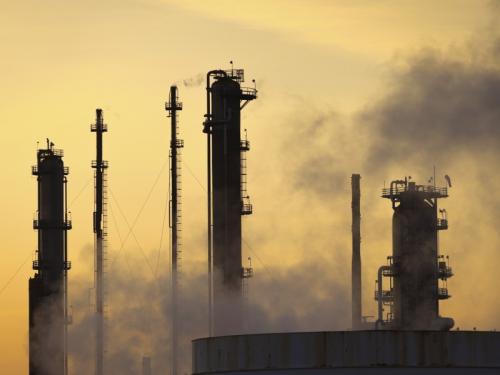GROUPS SUE OVER WEAK EMISSION STANDARDS FOR CHEMICAL PLANTS LINKED TO CANCER
EPA’s rule for organic chemical facilities allows toxic air pollution at levels dangerous for public health
On Oct.13, 11 community, scientist, environmental, and environmental justice groups represented by Earthjustice sued the Environmental Protection Agency (EPA) over a weak national emission rule for hundreds of chemical facilities whose pollution is linked to cancer. The Miscellaneous Organic Chemical Manufacturing, or MON rule, regulates toxic emissions for about 200 chemical plants across the country. These plants emit over 7,400 tons a year of dangerous air pollutants, including at least 2,000 pounds of ethylene oxide, an aggressive carcinogen. EPA updated the rule earlier this year after the national air toxics assessment showed this pollution is contributing to cancer risk hot spots in the United States.

Smoke stacks and distillation towers at a large petrochemical plant are silhouetted against the golden evening sky.
Industrial plants covered by the MON rule handle chemicals used in the production of solvents, plastics, and pesticides. During this process, potent carcinogens, like ethylene oxide, 1,3-butadiene, benzene, formaldehyde, and other toxic fumes that people breathe, are dumped into neighboring communities. The MON rule leaves people in surrounding areas exposed to cancer risks of 200-in-1 million, twice the level EPA admits is unacceptable under the Clean Air Act.
“EPA’s recognizes that communities are facing a blatantly unacceptable cancer threat from breathing toxic air every day, yet it does little to fix this problem,” said Emma Cheuse, Earthjustice attorney. “It’s unjust and wrong that the agency is again refusing to set standards that fully protect children and families living next to petrochemical sources. Now, in the middle of a respiratory pandemic, communities have to take EPA to court to ensure that chemical plants use up-to-date pollution controls, and common-sense fenceline monitoring for the toxic air they release into nearby neighborhoods.”
MON facilities are located around the U.S., but especially concentrated in Texas and Louisiana, and disproportionately affect Black, Latino, and low-income communities. Other states with MON facilities include West Virginia, Illinois, and South Carolina. EPA's MON rule allows periodic, uncontrolled releases of chemical pollution, while communities need around-the-clock protection from toxic air. This rule allows facilities to spew fugitive emissions into communities without monitoring, and permits facilities to do so repeatedly, even if pollution levels are too high.
As communities push for monitoring and stronger rules for chemical plants, the petrochemical industry is expanding in places like Cancer Alley in Louisiana, which is already facing elevated cancer levels due to industrial fumes. In fact, Formosa Plastics’ petrochemical complex in St. James Parish is still on the table while RISE St. James and their partners are fighting its illegal permits in Louisiana state court. The complex would include 14 plants just one mile from an elementary school in a predominantly Black neighborhood. A weak MON chemical plant rule is disastrous for the health of St. James Parish, particularly if plans for the Formosa complex are allowed to proceed.
EPA has known of the pollution and extreme health harms associated with MON plants for years; still, it chose inaction. According to federal law, EPA was supposed to review and update the national MON standards by 2014, but years later, the agency had still failed to meet the deadline. Communities affected by these emissions represented by Earthjustice, forced EPA to finish the rule through litigation and in 2017 a court ordered EPA to review and update this rule.
Earthjustice is representing RISE St. James, Louisiana Environmental Action Network, Louisiana Bucket Brigade, TX Environmental Justice Advocacy Services (t.e.j.a.s.), Air Alliance Houston, Ohio Valley Environmental Coalition, Blue Ridge Environmental Defense League, Environmental Justice Health Alliance for Chemical Policy Reform, Environmental Integrity Project, Union of Concerned Scientists, and the Sierra Club. These groups have also filed a petition for reconsideration with EPA. RISE St. James, Louisiana Bucket Brigade, and allied groups, represented by Earthjustice, are also fighting the illegal and dangerous air permits Louisiana issued to Formosa Plastics, and challenging another rule (ethylene production) that would apply to Formosa Plastics and similar petrochemical facilities as illegally weak.
Source: Earthjustice
- 301 reads
Human Rights
Ringing FOWPAL’s Peace Bell for the World:Nobel Peace Prize Laureates’ Visions and Actions

Protecting the World’s Cultural Diversity for a Sustainable Future

The Peace Bell Resonates at the 27th Eurasian Economic Summit

Declaration of World Day of the Power of Hope Endorsed by People in 158 Nations

Puppet Show I International Friendship Day 2020

